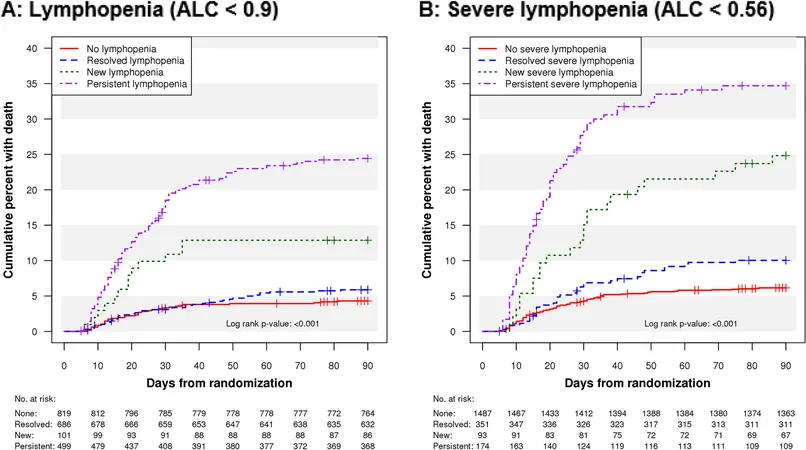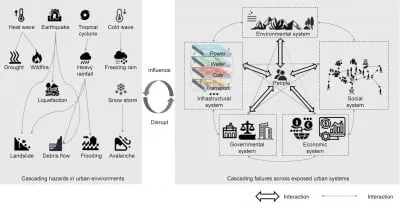
Unveiling the Critical Role of Lymphocyte Count in COVID-19 Severity: Key Insights from a Major Trial
2025-01-15
Author: Siti
In a groundbreaking analysis conducted within the framework of the TICO platform trial, researchers uncovered pivotal insights into how blood lymphocyte levels might significantly influence the outcomes for hospitalized COVID-19 patients. This extensive study, which enrolled 2,753 participants from around the globe between August 2020 and November 2021, sought to determine the time to sustained clinical recovery and mortality rates associated with different levels of lymphocyte count.
Understanding the Study Design
The trial, registered under NCT04501978, meticulously gathered demographic and clinical data on participants with a specific focus on their absolute lymphocyte count (ALC) noted within the 24 hours prior to their randomization into various treatment arms. The study primarily assessed five antiviral interventions, each tested against a placebo, to measure sustained recovery – defined as returning to normal residence for 14 consecutive days by day 90 post-randomization. Alongside this, researchers looked at mortality rates as a crucial secondary outcome.
Blood Counts: The Key Benchmark
The critical takeaway from this analysis is that a lymphocyte count lower than 0.9 × 10^9/L signifies lymphopenia, while a more severe threshold below 0.56 × 10^9/L classifies patients as suffering from severe lymphopenia. Notably, 1,426 participants entered the trial with lymphopenia, and 636 of them with severe lymphopenia recorded at day 0.
Mortality and Recovery Rates: What the Numbers Reveal
Results from the study painted a concerning picture: patients with either new or persistent lymphopenia had significantly higher mortality rates compared to their counterparts who did not exhibit lymphopenia. By day 90, nearly 25% of patients with persistent lymphopenia succumbed to the disease, while the mortality rate for those with no lymphopenia remained around 5%. Furthermore, figures suggested that persistent lymphopenia correlated with a higher likelihood of secondary infections and obstructed recovery efforts.
A Comprehensive Analysis of Participant Profiles
The study determined distinctive traits among participant groups regarding their lymphopenia status. Older age, coexisting illnesses, elevated levels of inflammatory biomarkers, and greater oxygen demands emerged as common among those with persistent lymphopenia. Moreover, those infected during the period of the Delta variant compared to earlier strains were more prone to severe lymphopenia.
The Broader Implications on COVID-19 Outcomes
This analysis not only reinforces the critical importance of monitoring lymphocyte counts in COVID-19 patients but also suggests new hypotheses regarding the mechanisms behind lymphopenia. The findings hint at possible correlations between cytokine-mediated effects and poor immunological responses leading to severe outcomes in infected patients. Surprisingly, even in patients presenting with low lymphocyte counts, antibodies were still detectable, hinting at a potential functional presence of B cells.
Key Takeaways and Future Directions
As the research uncovers, monitoring ALC over time could be more predictive of COVID-19 severity than single measurements and could serve as crucial data for tailoring therapeutic approaches. While the exact biological mechanisms behind lymphopenia in the context of COVID-19 remain elusive and warrant further investigation, the data suggests that focusing on lymphocyte trajectories could enhance patient outcomes and inform more effective clinical management strategies.
As healthcare professionals prepare to face the evolving challenges of COVID-19, these insights could potentially revolutionize how treatment is approached, including assessing patients' lymphocyte profiles to tailor therapeutic interventions and improve survival rates in the most vulnerable populations.
Stay informed – the battle against COVID-19 is far from over, and every piece of research is a step closer to understanding and defeating this formidable virus!



 Brasil (PT)
Brasil (PT)
 Canada (EN)
Canada (EN)
 Chile (ES)
Chile (ES)
 Česko (CS)
Česko (CS)
 대한민국 (KO)
대한민국 (KO)
 España (ES)
España (ES)
 France (FR)
France (FR)
 Hong Kong (EN)
Hong Kong (EN)
 Italia (IT)
Italia (IT)
 日本 (JA)
日本 (JA)
 Magyarország (HU)
Magyarország (HU)
 Norge (NO)
Norge (NO)
 Polska (PL)
Polska (PL)
 Schweiz (DE)
Schweiz (DE)
 Singapore (EN)
Singapore (EN)
 Sverige (SV)
Sverige (SV)
 Suomi (FI)
Suomi (FI)
 Türkiye (TR)
Türkiye (TR)
 الإمارات العربية المتحدة (AR)
الإمارات العربية المتحدة (AR)